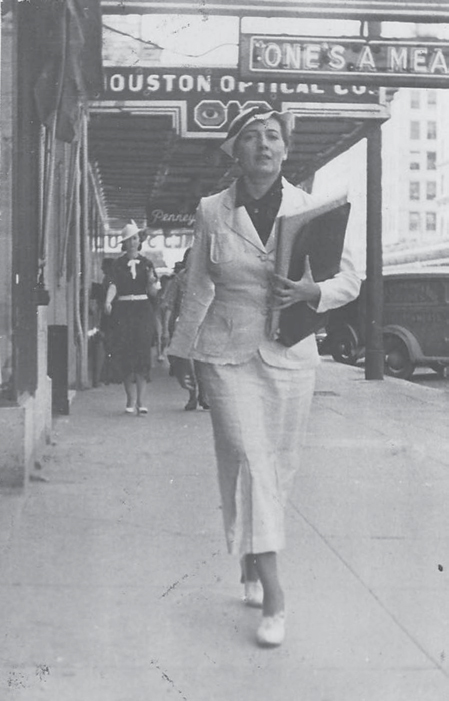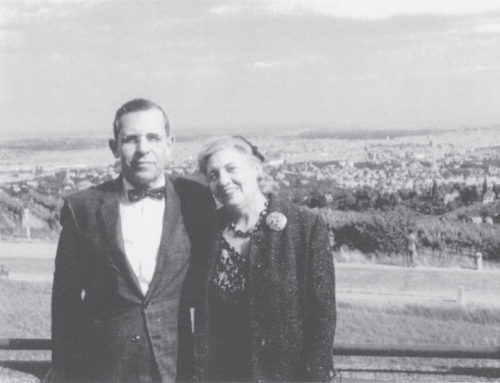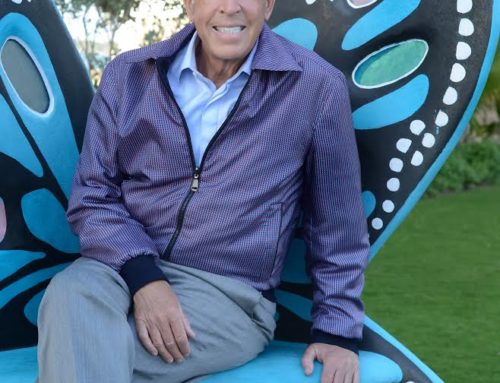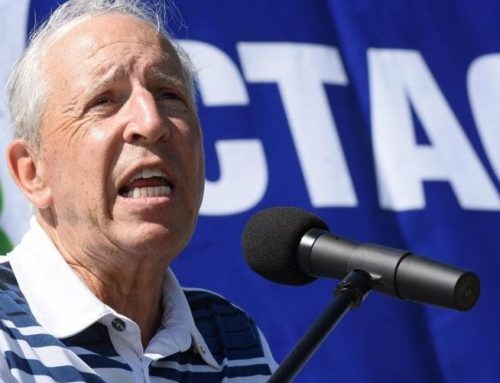Rambling Round with Rosella by Vickie Vogel Texas Jewish Historical Society – May 2015
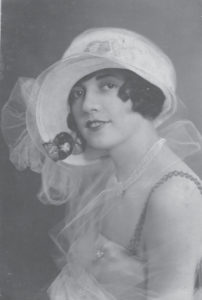
Rosella in Galveston, c. 1928. Photo courtesy of Joella Werlin.
Young Rosella Horowitz lacked confidence because she believed she was a plain little girl, yet she rose to national prominence in her chosen fields, journalism and publicity.1 She was born to Russian immigrants, Rabbi Henry J. and Cecilia (Celia) Feinberg Horowitz, on September 23, 1904 in New York City. Rabbi Horowitz moved his family to Texas around 1918,2 living in Tyler and other areas before settling in Galveston. As a child, Rosella read The Ugly Duckling and dreamed that when she awoke and looked in the mirror, she was beautiful. This anecdote was written up in a column by Dale Carnegie, the motivational writer and speaker.
Carnegie goes on to say that when Rosella got a job on a newspaper, and went out on her first interview assignment, she was so nervous she kept walking past the door, afraid to ring the bell. Finally, she went in and got the interview, and received compliments from her city editor. Then she read a newspaper article that changed her life. It said the way to cure an inferiority complex was little by little. “That is, achieve success in some small thing, realize if you have done it once you can do it again.” Success with her first interview gave her confidence she could do it again.
Her career began in 1924 as a reporter on the San Antonio Light. “Jobs for women in the news- paper business were nonexistent in those days. In fact, ‘nice girls’ didn’t do that kind of work – it was just like being in the theater.”
Petite at 5’1 1/2” tall and weighing less than a hundred pounds, Rosella went to work for nothing, and when she was “good enough,” they paid her $15 a week. From San Antonio, she went to the Chicago Sun Times and interviewed Al Capone when he was released from prison. “He wasn’t the friendliest person,” she later recalled.
In February, 1929, Rosella interviewed a school teacher who had just returned from eight years on a kibbutz in Palestine. There is a copy of the article in our archives: “No Gangsters in Palestine: Goldie Meyerson Here on Tour to Raise $40,000.” Meyerson became better known as Golda Meir.
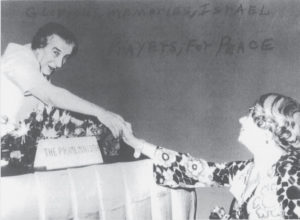
Rosella Werlin with Prime Minister Golda Meir. Photo courtesy of Ernest Werlin
Rosella studied at the Universities of Texas, Missouri, and Chicago, as well as Washington University, Incarnate Word, and the University of Houston where she received her Bachelor of Science in 1935. Over the course of her career, she also worked for the St. Louis Globe Democrat, Galveston News-Tribune, United Press International, the Houston Press, and the Chicago Journal. She contributed to over 100 publications.7 She handled publicity for the municipal advertising committee of Galveston in 1929-30, did freelance publicity in Chicago in 1934, and taught journalism at Sam Houston High School from 1935 to 1938.
In 1928, she married Joseph S. Werlin, and they moved to Illinois while he studied for his doctorate at the University of Chicago. They returned to Texas in 1934, where Joseph became a founding faculty member of the University of Houston, which was in the process of becoming a four-year school.
Rosella went into publicity and began making a name for herself. The Galveston Chamber of Commerce decided to create a publicity department. I. H. Kempner asked a board member, Silas P. Ragsdale, editor of the Galveston Daily News and Galveston Tribune for 29 years, who he planned to hire. Ragsdale said, “Rosella Werlin.” Kempner looked doubtful and said, “But she’s so persistent.” Ragsdale asked, “But don’t you think she can do the job?” Kempner admit- ted, “She can do that, all right.”
She served as Publicity Director for six years, perhaps the only woman in such a position in a large city in the United States, and became known for her clever publicity stunts. Regarded as a capable writer and “idea girl,” she won nationwide attention for Galveston with stories such as the Badgett quadruplets, and for initiating or promoting the Tarpon Rodeo, the Oleander Festival, Splash Day, Mardi Gras festivities, the Perfect Back contest, the Carhop Queen contest, and Community Chest drives. She originated the annual Hay Fever contest in 1938, which included Disney’s Sneezy as mascot. The contest got Galveston 3000 inches of publicity.
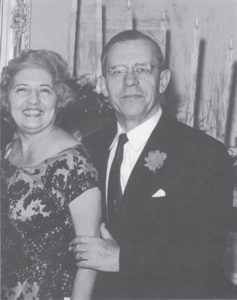
Joseph and Rosella Werlin on their 25th wedding anniversary, 1953. Photo courtesy of Ernest Werlin.
Werlin sent a cotton turkey to Herbert Hoover during the depression to remind him of Galveston’s role in the economy. She met Jack Dempsey in Galveston and planned a photo shoot to promote fishing on the island. Dempsey showed up in a suit, held the fishing gear backward, and the fish weren’t biting. Rosella bought scaled fish in a market and put those at his feet for her picture. It was such a fiasco, sports editors all over the country ran it with hilarious stories about fishing fashions. It was printed in thirty dailies and got the message of Galveston to a million readers.
When President Franklin Roosevelt visited, and when the causeway was dedicated, Rosella handled the news. She was named to Who’s Who in America for her publicity work as a member of the war bond committee. Her special recognition from the Treasury Department for her war bond work was written up by the Houston Chronicle.
The Houston Press said Rosella Werlin “has done as much to keep Galveston on the map as the sea wall…”
Rosella resigned her Galveston job to do freelance publicity and feature writing in Houston, where her husband was Chairman of the Sociology Department.11 A pastel green brochure in our archives announces the formal opening of her agency for publicity and public relations (“Publicity with a Punch”), specializing in conventions, festivals, community service, and preparation of pamphlets, bulletins, and brochures. The Dale Carnegie column and many testimonials are included in the brochure.
Rosella and Joseph Werlin began one of the first international study programs at the University of Houston, Werlin International Cultural Tours, which specialized in taking students to Central America and Europe.
Famed Houston Post columnist Marge Crumbaker announced that the Women in Communication were honoring Rosella Werlin at the Press Club for her 50 years in “the biz.” Rosella told Marge that would be a neat trick because, for quite a while now, she had been telling people her age was 39. “I’m 39 and holding,” laughed Rosella.
In 1973, Rosella was visiting Alaska when word came that Canadian Prime Minister Pierre Trudeau (who was dating Barbra Streisand at the time) was in a nearby town, so Rosella went to see him and got an interview.
In 1979, she received the Woman of Achievement Award of the National Federation of Press Women.
Rosella was involved in a landmark lawsuit in copyright law over an article she wrote about a child with Down’s Syndrome who was celebrating her bat mitzvah. She mailed a copy to Readers’ Digest for publication, but after eight months had received no word. She ran into the child’s parents and they mentioned Readers’ Digest was sending a writer to interview them for an article. When it was published, Rosella recognized much of it as her story. She confronted the magazine, and they paid her $250 for what they called “her idea.” She sued for copyright infringement and was awarded $500 in damages, but the case was even more important in protecting authors’ rights to their work product.14
Rosella attended the first International Women’s Conference in Mexico City in 1975.15 In 1981, Rosella Werlin became the first Houston-Galveston area woman appointed delegate to the White House Conference on Aging, one of 76 delegates from Texas and one of 2000 nation- wide. Each Congressman was allowed one appointee, and Congressman Ron Paul selected Rosella. A letter in the archive file from Ronald Reagan of March 1, 1982 thanks her for a plaque she sent him following her attendance at the conference.
Over her long career, she participated in many civic enterprises, including the anti-tuberculosis campaign. She was on the Houston YWCA publicity board, the Galveston Committee for Defense in 1941, and Galveston County publicity chair for American Women Volunteer Service in 1942. She was a member of Bundles for Britain, the Texas Press Association, the Texas Woman’s Press Association, Texas Exes, the Penmen’s Club, the League of Women Voters, B’nai B’rith Women, and Business & Professional Women. She was co-editor of a history of Galveston published in 1941.
Rosella Werlin was interviewed and written about many times. She wrote columns for several newspapers, including “Just Between Ourselves” for the San Antonio Light, and “Rambling
Round with Rosella” for the Galveston News. Rosella Werlin died at Methodist Hospital in Houston on April 1, 1985 after suffering a stroke. She was 82.

